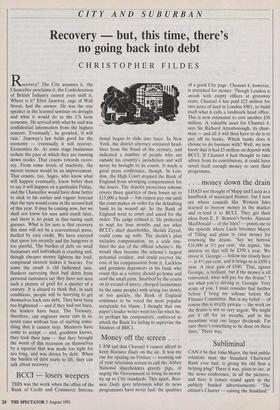CITY AND SUBURBAN
Recovery but, this time, there's no going back into debt
CHRISTOPHER FILDES
Recovery? The City assumes it, the Chancellor proclaims it, the Confederation of British Industry cannot even sniff it. Where is it? Eliot Janeway, sage of Wall Street, had the answer. He was the star speaker in the learned seminar on drought and what it would do to the US farm economy. He arrived with what he said was confidential information from the highest sources: 'Eventually', he growled, 'it will rain.' Janeway's law holds good for the economy — eventually it will recover. Economies do. At some stage businesses reduce the pace at which they are running down stocks. That counts towards recov- ery. From some levels of inactivity, the merest tremor would be an improvement. That counts, too. Sages, who know what will happen eventually, know better than to say it will happen on a particular Friday, and the Chancellor would have done better to stick to his earlier and vaguer forecast that the turn would come in the second half of this year. It may be coming now, but we shall not know for sure until much later, and there is no point in fine-tuning such guesses. What is for sure is that recovery this time will not be a conventional spree, fuelled by easy credit. We have enjoyed that spree too recently and the hangover is too painful. The burden of debt on small businesses and individuals is crushing and, though cheaper money lightens the load, compound interest makes it heavier. For some the result is old fashioned ruin. Bankers surveying their bad debts from personal customers say they have not seen such a picture of grief for a quarter of a century. It is absurd to think that, in such conditions, people will be hurrying to get themselves back into debt. They have been too frightened — and if they had not been, the lenders have been. The Treasury, therefore, can engineer more cuts in in- terest rates without fear of starting some- thing that it cannot stop. Ministers have come to accept — and, goodness knows, they took their time — that they brought the worst of this recession on themselves by a squeeze that was made too tight for too long, and was driven by debt. When the burden of debt starts to lift, they can talk about recovery.


















































 Previous page
Previous page